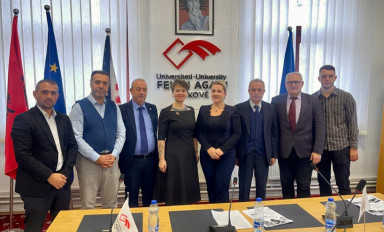Physiotherapy
The Professional Bachelor study program in Physiotherapy is based on offering theoretical knowledge and practical professional skills with the aim of practicing physiotherapy according to the specific requirements of this regulated profession in the Republic of Kosovo.
The fundamental mission and vision of the University is to create, promote, and transform knowledge. The mission of the "Physiotherapy" study program is consistent with the mission of UFAGJ as a whole and the specific mission of the Faculty of Medicine. Through this attractive applied program, the aim is to offer students a unique academic, professional, and research experience in cooperation with actors in the field (all public health institutions in Kosovo, private health institutions, sports clubs, and various other organizations) in order to prepare young, capable, and competent professionals for the local and international labor market.
The Mission of the Physiotherapy Program is the preparation of health professionals in the professional profile of Physiotherapy, who, with theoretical, professional, and scientific knowledge, as well as practical skills and abilities to practice the profession in all places foreseen by relevant regulations and laws, will be capable of working in the public and private sectors, within and outside the country, in accordance with contemporary standards of the field.
The program aims for quality professional education and training, continuous formation, and the adaptation of its activities to social and economic developments. Young professionals will have the opportunity to learn from a program built on the basis of proven reference programs in respected universities, adapted to the specific local and international needs of the time. Furthermore, special importance in the design of the program and its progress will be given to the connection with the labor market, as a necessity in perfecting the academic offer.
|
Name of study program |
Physiotherapy |
|
Qualification level according to NQF |
BSc (Level 6 according to the National Qualifications Framework) |
|
Academic degree and diploma title |
Professional Bachelor in Physiotherapy |
|
Field of study according to ESAC |
12.6 |
|
Profile of academic program |
Academic |
|
Minimum duration of study |
3 years (6 semesters) |
|
Mode of study |
Regular (Full-time) |
|
Number of ECTS credits |
180 ECTS |
The study program aims to link the theoretical part and fundamental knowledge of health fields with practical training for mastering techniques and applied skills in practicing the profession. Teaching will be integrated between theory and practice, while special importance will be given to the integration of the newest scientific knowledge into decision-making processes. The training and development of new cadres in concepts of co-creation, critical thinking, and learning based on health/research cases and situations will be the main innovation distinguishing this program from existing ones.
The objectives of the Physiotherapy program are the preparation of staff to:
-
Gain theoretical and practical knowledge in basic, human, and professional sciences, including principles, characteristics, boundaries, and general and specific terminologies within a subject, discipline, or field of work to reach an informed judgment about theories and practices to lead it.
-
Learn to identify professional values by understanding one or more specializations, which are the most advanced part of a subject, discipline, or field of work.
-
Demonstrate mastery and innovation to solve complex and unforeseen problems in the field of physiotherapy through the practice of professional-level contexts, which include a degree of unpredictability and/or specialization, and the demonstration of originality and clarity when working with professional issues, judging in situations where data is limited or derived from different sources.
-
Demonstrate knowledge and understand ways of developing a subject, discipline, or field of work, including a range of defined data collection techniques or research methodologies.
-
Demonstrate mastery and innovation to solve complex and unforeseen problems in the field of physiotherapy through the use of manipulative skills, proven practices, biomechanical and kinesiological techniques, and specialized and advanced materials (technology and ortho-prosthetic aids).
-
Demonstrate mastery and innovation to solve complex and unforeseen problems in the field of physiotherapy through the execution of defined research, development, or investigation projects and the identification and implementation of findings.
-
Carry out tasks or studies involving the management of complex technical and professional activities or projects, which may include responsibility for decision-making in unforeseen work or study contexts, or manage the professional development of individuals and groups, including effective action under leadership in cooperation with other qualified colleagues, exercising autonomy and initiative during professional activities, and taking primary responsibility for the work of others and for a range of resources; cooperating with others to ensure changes, development, and/or new ideas; and dealing with ethical and professional issues in accordance with existing professional codes and practices.
-
Face different conceptual models, along with their benefits and limitations in various hospital and non-hospital environments.
-
Identify the health needs of the individual and various groups within the community.
-
Formulate short-term and long-term objectives of the rehabilitation process.
-
Plan, draft, and direct the physiotherapeutic process.
-
Identify health determinants using the "biopsychosocial" approach.
-
Realize the physiotherapeutic process in accordance with local and international laws in force.
-
Assist in creating support personnel and cooperate directly in improving their professional role and in scientific research.
Student assessment is done in accordance with the subject syllabus; student assessment is done according to the following table:
|
Point evaluation |
Final Grade |
|
91 – 100 |
10 |
|
81 – 90 |
9 |
|
71 – 80 |
8 |
|
61 – 70 |
7 |
|
51 – 60 |
6 |
|
40 – 50 |
5 |
Students graduated from the BSc Physiotherapy program can be employed in a wide range of health institutions such as in:
-
Primary, secondary, and tertiary levels.
-
Rehabilitation Centers.
Graduated students have extensive employment opportunities in all health institutions within and outside the country.

 Library
Library .jpg)


.png)
